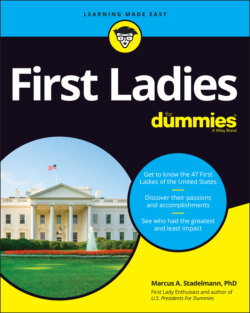Читать книгу First Ladies For Dummies - Marcus A. Stadelmann, Marcus A. Stadelmann PhD - Страница 55
Abigail Smith Adams (1744–1818)
ОглавлениеAbigail Smith Adams (see Figure 4-1) was born on November 22, 1744, in Weymouth, Massachusetts. Her mother was a descendant from one of the oldest and most prominent families in Massachusetts, the Quincy family. Her father was a minister who had graduated from Harvard University. He was responsible for most of Abigail’s schooling, and early on she was an avid reader, familiarizing herself with the great works of the day. She also fell in love with writing, which resulted in almost 1,200 letters to her husband, John Adams, which gave historians a glimpse of not only political life in the late 18th century but also her political influence on the future president.
Source: Library of Congress, Prints & Photographs Division, Reproduction number LC-DIG-hec-13515 (digital file from original negative)
FIGURE 4-1: Abigail Smith Adams.
Abigail was introduced to John Adams by her sister’s fiancé. John Adams at the time was a Harvard-educated lawyer. He was infatuated with her right away, being impressed with her intelligence, and the two got married in a ceremony presided over by her father on October 25, 1764.
Abigail was the first politically active First Lady. She was well educated, articulate, and intelligent. She often discussed political issues with her husband before he made his decisions. She was very influential in policy making and wasn’t afraid to discuss politics with her husband.
Abigail has the distinction of being one of two First Ladies who was married to a president and gave birth to a future president. The other one was Barbara Bush.
Abigail was one of the first feminists in American history. She fought for equal rights for women as early as the late 18th century. In a 1776 letter she sent to John Adams while he was attending the second Continental Congress, which was working on the Declaration of Independence, she wrote:
I desire you would remember the ladies and be more generous and favorable to them than your ancestors… . Do not put such power into the hands of the husbands, … Remember that all men would be tyrants if they could… . If particular care and attention is not paid to the ladies, we are determined to foment a rebellion, and will not hold ourselves bound by any laws in which we have no voice, or representation.
Abigail was also opposed to slavery. She called slavery antithetical to Christian principles of doing onto others as we would have others do onto us.
